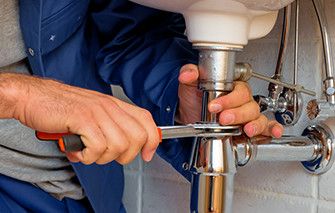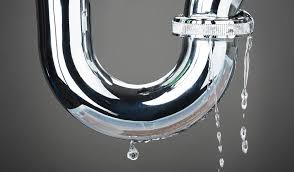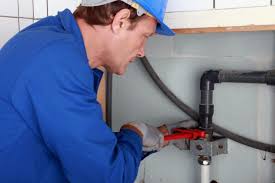EMERGENCY PLUMBING – MANAGING WATER LEAK AND BROKEN PIPE
The first step to becoming a successful homeowner or renter is knowing basic emergency plumbing tips. It is no longer news that the joy of owning a home vanishes when emergencies strike. The frustration of an emergency plumbing problem is even more intense if house occupants are totally ignorant of how their plumbing system works or where the control valves are located. I agree that not everyone is gifted with plumbing skills and we all cannot be plumbers. However, it does not hurt to know the basics of your home plumbing system, just in case your water line chooses to burst and flood your house when you cannot get a hold of a plumber immediately.
A broken water pipe is not the only emergency plumbing problem to watch out for. Clogged drains, frozen pipes and sewer backup are some of the other common emergency plumbing issues. A clogged drain slows or stops water from flowing in the drainage system and in a worst case scenario, the whole plumbing system blocks to a halt and occupants cannot use water anywhere in the house without having an overflow situation. The key to averting the ugly situation described above is knowing the basics about your plumbing systems and ultimately having an idea of what to do in plumbing emergencies.
Managing Emergency Plumbing, Water leak or broken pipe
It is important to know the location of all of the shut-off valves controlling water supply to your utilities and appliances in the kitchen, bathroom, toilet, basement and yard. Carefully inspect your kitchen sink, toilet pipes, water heaters, heating systems, tubs and other appliances to locate the shutoff valve
feeding water into them. Another very important valve you must know the location is the main shutoff valve supplying water to your entire house. If you cannot find the stop valves for your systems or if you are not sure where to look, ask your plumber anytime you have him working at your house. Getting this information from a professional will help boost your confidence when you have to deal with an emergency water leak and broken pipe because then you know for sure what to turn off.

What is Considered a Plumbing Emergency?
There is a risk of flooding
Flooding due to a failed sump pump, burst pipe, sewer back up, or water shut off valve failure, are all examples of plumbing emergencies. Flood damage can cause significant damage to structures and is a safety concern, therefore should be addressed as soon as possible.
There is a sewer back up
When a sewer line backs up, sewage sits at its back up point, creating a health hazard. It prevents the ability to use the facilities or run water, which makes living difficult as well.
You are without water
Not having access to running water is also a safety concern because, like a sewer back up, prevents you from using the facilities, but also effects cooking and cleaning.
There is a risk of a burst pipe
Frozen pipes and/or spigots lend themselves to two of the above concerns: risk of flooding and no water. If a pipe is frozen, not only is water not able to pass through it, but it expands, causing it to crack, which means once it thaws, it presents the risk of flooding. It’s important to know where your water shut off valves are located and how they work. As your plumber during his or her preventative maintenance visit to show you, if you don’t already know.

10 Most Common Plumbing Emergencies
- Clogged sinks: You’re doing the dishes in the kitchen or brushing your teeth in the bathroom and the sink refuses to drain. A slow drain is annoying, but it’s not necessarily an emergency. However, if the clog becomes severe, water flow may stop completely, which could cause a serious slow down of your daily activities.
- Clogged toilets: Is your toilet clogged, making strange noises, leaking or refusing to flush? Since the toilet is the most used fixture in your home, any of these common plumbing emergencies are enough to ruin your day. Try some DIY tips for unclogging the toilet, but remember an unresolved problem can allow leaks to cause structural damage or raw sewage backups to present health hazards.
- Clogged bathtubs and shower drains: You’re taking a shower and the water starts rising to your ankles, or a strange gurgling sound comes from the drain. Soap scum and hair buildup are the most common reasons behind this plumbing emergency.
- Leaky faucets and toilets: The constant drip, drip, drip is enough to annoy anyone, but leaky faucets and toilets can also rack up your water bills, cause rust to form and facilitate mold growth.
- Leaking water heater: If you discover a leak or other problem interrupting your hot water supply, you could be wasting a lot of money on water heating. A leak can also cause property damage. A leaky water heater valve can be easily replaced, but if the water heater wall has completely rusted through, you need an entirely new water heater to overcome the problem.
- Leaky washing machine hoses: Washing machines are sturdy, durable appliances, but the water hoses are often the weakest link. If you discover a cracked or bulging hose behind the washer, don’t ignore it or mold and rust could become serious problems.
- Broken water lines: Tree roots, earthquakes and poorly aimed shovels can cause underground water lines to break. This can cause soggy areas in the yard, poor water quality and no or very low water pressure.
- Burst pipes: The freeze-thaw cycle can cause exposed pipes to burst. This problem could turn into a complete pipe replacement, which would need to be handled by professionals.
- No hot water: It’s what nightmares are made of: you hop into the shower and soap up with your favorite body wash when suddenly the water goes ice-cold. You could be experiencing a water heater malfunction, electrical issue or plumbing leak. Then again, it could be your utility company’s fault that you have no hot water.
- Sewer system backup: It’s another plumbing nightmare no one wants to experience. Sewer backups are messy, costly and inconvenient, to say the least. Signs of a sewer system backup include multiple drain clogs, bad sewage odors coming from the drains, gurgling toilets, and water pooling around the basement floor drain.

Signs of a Leak in Your Water Main
Considering how difficult it is to identify leaks, there are a few signs that homeowners can pay attention to and rely on as indicators of a leaking pipe in the home.
Here is a list of the most common signs to look out for:
- Water in the Street- This is perhaps one of the most common signs of a leaking main water line. When a pipe ruptures and the leaking water has nowhere to go, it will bubble up into the street. When homeowners notice bubbling water in the street, it is advisable to get plumbing services immediately.
- Water in Your Yard- Other clear signs of a possible leak or leaks in the pipes are unexplained wet areas in the yard as well as sinkholes. Since these conditions can pose a significant danger to the children and animals in your compound, you should call for professional plumbing services from Beehive Plumbing once you notice the signs.
- Puddles in Your Home- Water that accumulates in your home, especially under sinks or on the floor, could be an indicator of a leak in the pipes. While some of the problems may be easy to detect, those behind walls and ceilings will not be easily visible. Having an inspection of your plumbing system will help to reveal these problems.
- Wet Spots- It is important to inspect the areas around sinks, toilets, and tubs. You should look out for discolored areas or wet spots, as these may reveal to you the leaks in your plumbing system.
- Damp Drywall- Damp drywall and ceilings with wet rings are clear signs of water from a leaking pipe. If this problem is left without being addressed, it may cause great damage to your home structure. Homeowners should call qualified plumbers at Beehive Plumbing to repair the defects so that there is no further damage to the property.
- Unexplained High Water Bills- When you have not had any unusual activity in your home but have unexplained high water bills, this could be a sign of a leaking pipe. When considering this as a possible sign, you should keep in mind other signs such as puddles, damp drywall, wet rings on the ceiling and wet areas. The physical indicators can also help you to detect plumbing problems.
- Low Water Pressure- When you experience low water pressure but there is an assurance of water supply, this means that there is a problem in the water main or the pipes in your home. Disturbances in the line, including ruptured or clogged pipes, may reduce the pressure of the water that reaches your home.
- Cracks in the Foundation of Your Home- Leaking water can seep into the foundation of your house, causing cracks to develop. When this goes on for a prolonged period, the leaking water will weaken the structural components of the home. This will manifest itself in the form of cracks in the walls and foundation.
- Water Sounds- Bubbling noises from the toilet or sink, whistling from the pipes, banging, dripping and clanking may be signs that some of the pipes in your home are broken. You should always pay attention to any sounds coming from areas likely to experience water leaks.
- Unpleasant Odor- When dirty water and sewage are not being channeled to the intended public sewer lines, there is bound to be an unpleasant odor in your home. This is a sign that the pipes may be backed up or blocked.
When It’s Time to Call a Plumber for a Clogged Drain
Questions to Ask Yourself
1st Question
When it comes to deciding when to call a plumber for a clogged drain, even those of us without plumbing experience can run through a decision tree in our minds, and fairly quickly, too. First question: Is there a mess that’s spreading? If yes, call the plumber. This is where “stitch in time” thinking works best. It may be a small mess that might at this point be kept in the sink. Or maybe you can contain it to an easily cleaned room. However, it could easily get out of hand without warning. The next thing you know, there’s a claim on homeowner’s or renter’s insurance for damaged furniture or carpeting. That can definitely add a lot of cost and inconvenience to the bill. And we won’t even go into what it would add to the cost if we have to go into a wall, ceiling, or floor.
2nd Question
Let’s go back to our decision tree. If the answer to the first question is no, then we move to the second point. Does the slowdown or blockage affect every drain in the house? If the answer is yes, the clog is in a main drain somewhere and needs to be taken care of by a professional. That means you should call a plumber. If the answer is no, then it’s a more localized issue. It could even be confined to one drain. Maybe not something that requires fast action.
3rd Question
When diagnosing the issue, it also makes sense to consider how soon the drain needs to be used. Is the clogged drain that one sink in the guest bathroom, for example? It may be okay to wait a bit before calling the plumber. Unless, of course, great-aunt Bessie is arriving today for her annual visit and she always uses the guest bathroom. In that case, the need to clear out that particular drain has just become both urgent and important. If, however, it isn’t easy to figure out what’s causing the problem, calling in the plumber is probably the best possible move.
4th Question
Which brings us to our next question: Is the clogged drain in a critical area? For example, is it in the kitchen sink? Or in the main floor lavatory that everyone uses? Or maybe the clogged drain is in the only bathroom in the house? Yikes. Of course, what qualifies as a critical area depends on the situation. If the answer is yes, call in the plumber. If the answer is no, there’s time to take a deep breath.
The point when deciding to call a plumber for a blocked channel is when it first becomes the user’s attention (s) of a particular fixture. “A stitch saves nine times” are good words to go through, especially when it’s a blocked channel problem. Addressing the problem immediately can prevent bad things from happening. Do you have blocked or slow channels? Contact a professional plumber now to schedule your appointment with a professional plumber of certified.